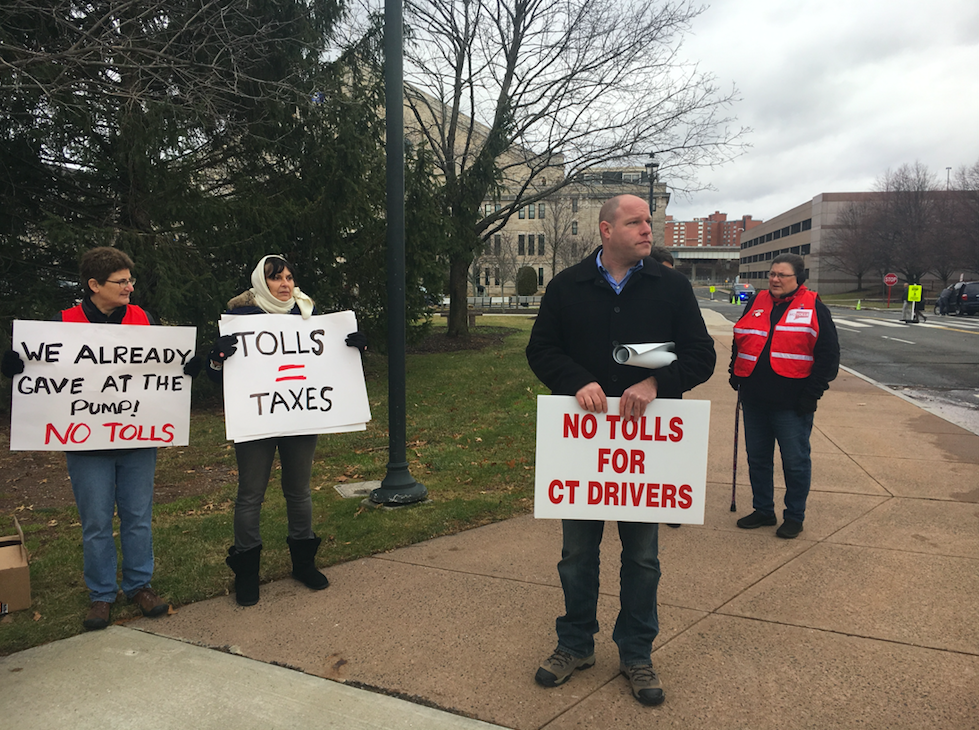In the lead-up to a potential December special session for Gov. Ned Lamont’s transportation plan that would implement tolls on trucks, No Tolls CT generated hundreds of emails from Connecticut residents to Democratic senators expressing their opposition to any plan that included tolls.
The grassroots organization picked three senators per day for their supporters to call or email, starting on Monday, December 9 with Senate President Pro-Tem Martin Looney, D-New Haven, Sen. Matthew Lesser, D-Middletown, and Sen. Steven Cassano, D-Manchester.
By Tuesday they moved on to Senators Christine Cohen, D-Guilford, Mary Abrams, D-Meriden, and James Maroney, D-Milford.
Aside of Looney, the email and phone call campaign focused on senators from potential swing districts where seats were won by small margins and, in some cases, where towns within those districts had passed resolutions opposing tolls.
By Wednesday, Lamont and Democrat leaders announced the legislature would put off a special session on transportation until January, and No Tolls CT put their campaign on hold.
Patrick Sasser, founder of No Tolls CT, says the short-lived campaign generated more than 300 emails that they are aware of, although the actual number, or number of phone calls and social media contacts, is unknown.
No Tolls CT provided copies of some of the emails.
In an email sent to Sen. Looney on December 9, the author wrote, “The tolls may be paid for by the owners of the trucks, but those costs will be passed down to all consumers. Tolls are another regressive tax that is an additional burden on Connecticut residents.”
“The notion that the tolls will be for trucks only is not believed by most people I know. None doubt that if passed, it will only be a matter of time before all vehicles will be included,” wrote another resident.
One real estate broker recounted the history of Connecticut’s real estate conveyance tax, noting that it was supposed to sunset after two years but was, instead, made permanent. “Can you understand why we don’t believe you and your colleagues when you say the tolls will only be limited to trucks?” he wrote.
In an interview with the press on December 11, Lamont said the special session on truck-only tolls was delayed because December was a “busy time of year,” and he wanted “a little more time to get everybody together” for a vote on a transportation proposal.
Regardless, Lamont says he has the votes to pass a transportation plan that includes tolls on trucks. “We got the votes, we just have to get all the people to this building,” Lamont said. “We’ll get them here in early January.”
Lamont said the tolls on trucks in Connecticut would not affect the cost of goods in the state because trucks already pass through states that have tolls.
“What we are saying that we have old bridges and 90-year old rail bridges that are not all in a state of good repair. We got to fix it, we got to pay for it,” Lamont said. “I’ve got a good way to do it on a consistent basis going forward and the truckers are going to be a part of that solution.”
Joseph Sculley, president of the Motor Transport Association of Connecticut, pointed out that 62 percent of freight in Connecticut is moved by truck from one place in the state to another, while 48 percent was interstate shipping either into or out of Connecticut.
“For all the talk about out-of-state trucks, this data shows that truck-only tolls will be merely another blow to our state’s economy,” Sculley said in a December 4 press release.
Sasser says he doesn’t believe the tolls will be limited to trucks and, regardless, his organization opposes tolls in any form.
“The governor himself keeps saying that tolling trucks is just a start,” Sasser said. “Whether it’s tolling trucks or cars and trucks, this is just going to raise the cost of living in Connecticut and push more people out of the state.”


Thad Stewart
December 21, 2019 @ 7:46 am
What part of No Tolls does the obtuse governor not get? Even trucks only, the middle class takes a huge hit. Goods and services go up. Why are the middle class the target for the democratic politicians financial faux pas? The only solution to this conundrum is SEBAC in the dumpster, 10% across the board spending cuts, and to stop the ability of the people in power to elect themselves raises. Anything else is totally unacceptable.